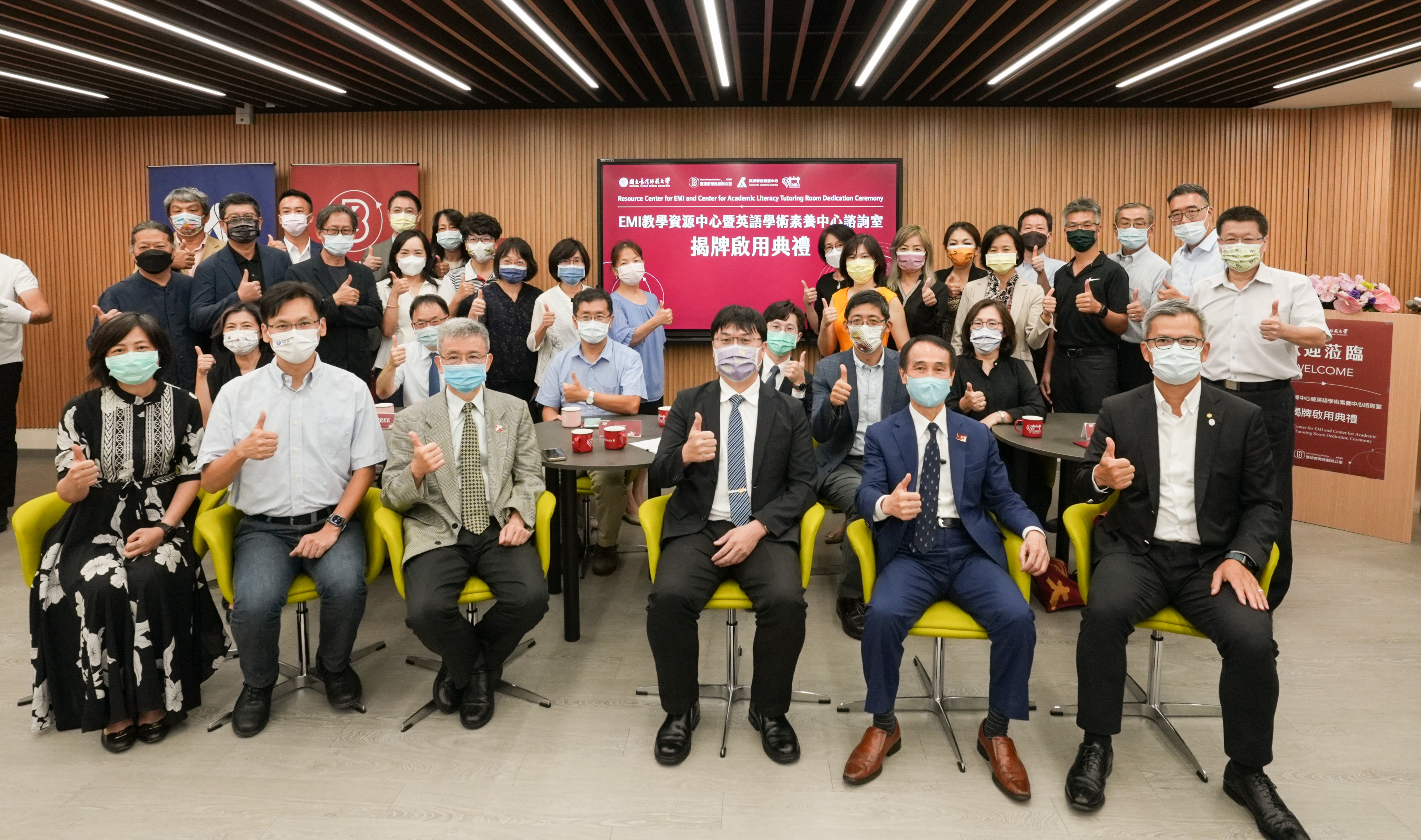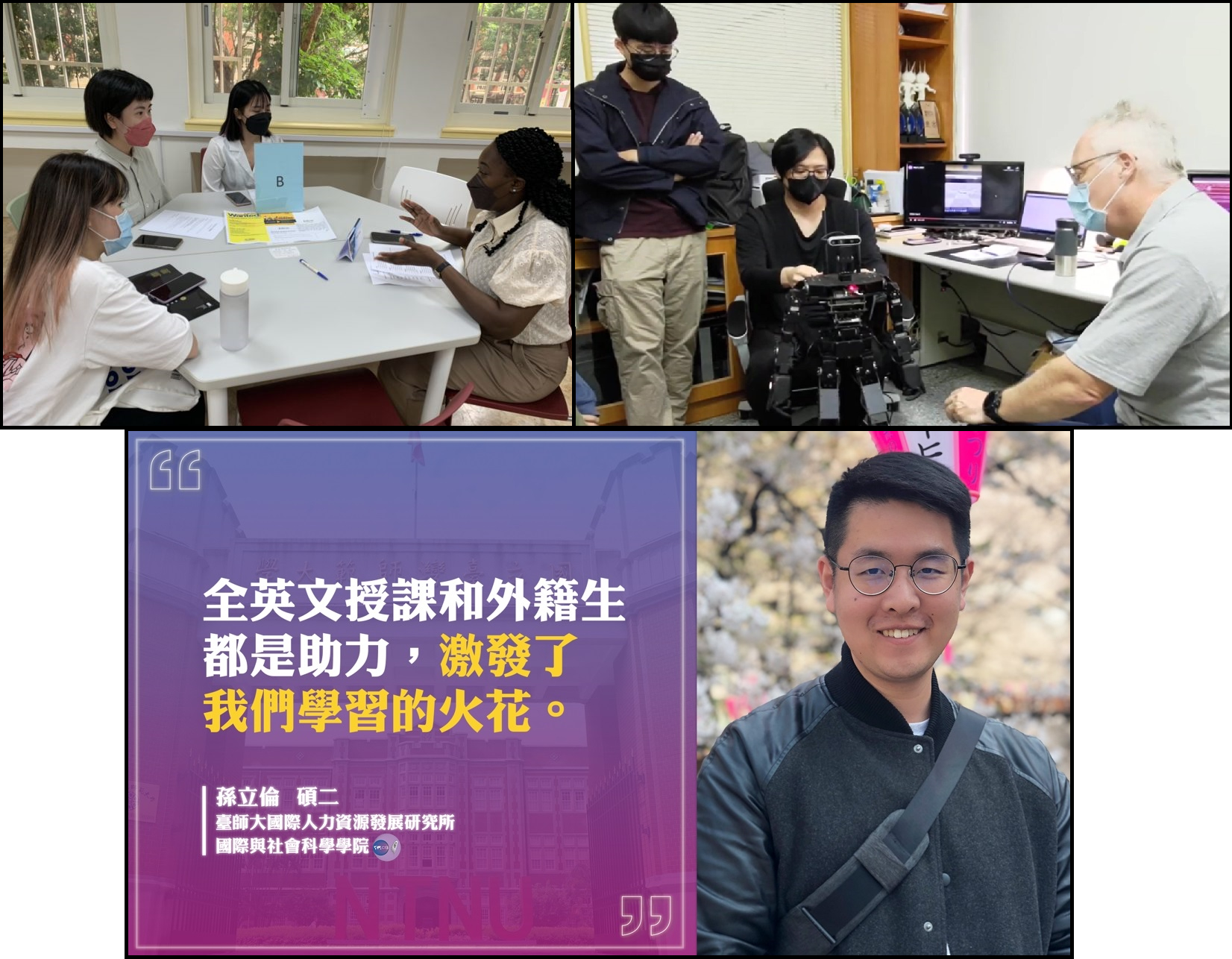Abstract
“Opportunities with Options”: NTNU’s Bilingual Education Strategies and Practices
Since becoming a beacon university of the BEST Program, National Taiwan Normal University (NTNU) has adopted the concept of “Opportunities with Options” as its program’s core. This means the university’s aim is to provide our students with more “options” by offering more English-mediated Instruction (EMI) courses and enhancing our students’ professional bilingual proficiency, and an “opportunity” to become an internationally competitive world citizen.
After a thorough and careful assessment of our resources and an examination of the foundation we have laid for bilingual education over the years, NTNU formulated a series of policies and strategies that would help us rise to the challenges ahead. In the following paragraphs, we will provide a description of the progress we have made in the last year in terms of our organization, our courses, and our faculty and students. We will then describe briefly how we have shared our experiences and know-how in our conclusion.
I. Organization
1. Establishing the Office of Bilingual Education as the Engine of BEST Program at NTNU
NTNU has created the Office of Bilingual Education (OBE) as the main executor of bilingual education polices at NTNU. OBE is tasked to consolidate the resources of all academic and administrative divisions of the university, and serve as the mediator for all stakeholders as we strategize bilingual education policies. Two complementary committees were also created along with OBE, namely, the Consultative Committee and the Implementation Committee. The Consultative Committee brings in external EMI experts along with EMI course instructors of the university to offer advises and feedbacks on our EMI policies; the Implementation Committee is consisted of the University President, Executive Vice President, the Vice President of Academic Affairs, and the deans of our 9 colleges, who will ensure all policies have been thoroughly discussed and implemented throughout the university.
2. Creating the Center for Academic Literacy to Scaffold Student Academic English Learning
NTNU created the Center for Academic Literacy (CAL) in 2021 to meet the expected rise in the demands for academic English support as the number of EMI courses increases. CAL not only helps our students enhance their writing proficiencies but also fosters an understanding of writing style suited for each field. CAL is also providing a comprehensive consultation service that covers writing for academic publications, cultivation of higher-level thinking skills (such as critical thinking, and literature review), and training for academic ethics and integrity. As of the Spring 2022 semester, CAL boasts 15 fully trained tutors specializing in areas such as education, information technology, sports, literature, science, arts, and business management. Many of these tutors are native English speakers, and when combined, they provide close to 2,000 hours of tutor service, making it the highest among all Taiwanese universities.
Figure 1 The opening ceremony of CAL’s Tutoring Room hosted by President Cheng-Chih Wu of NTNU, with honored guest Director Chun-Chang Chu of the Department of Higher Education, Ministry of Education.
II. Courses
1. Increase the Number of EMI Courses Systematically while also Enhancing Student English proficiencies
NTNU has readjusted our Common Core English program to better prepare our students for taking EMI courses. The new program has three stages, starting from English for General Purposes (EGP), to English for Specific Purposes (ESP), and finally reaching professional EMI courses offered by the colleges and departments of the university. The reformed program, along with the following strategies, will better address the most common problem of high listening and reading abilities with lower speaking and writing proficiencies. These strategies are: 1. Adopting the Quality Talk method developed by Pennsylvania State University of the United State to strengthen student’s higher-level thinking, collaboration, and expressiveness proficiencies in our EGP courses. 2. Offering ESP courses that are based on the disciplines of our colleges, to prepare students for professional EMI courses. 3. Offering academic English support at all levels (from bachelor’s to doctoral programs) through CAL.
Figure 2 Gradual enhancement of student English proficiency to EMI
2. All Undergraduate Programs offering at least 18 EMI credits, with Many Graduate Programs offering EMI Options
NTNU started a major push to increase the number of EMI courses by mandating all undergraduate programs to offer at least 18 EMI credits. The same rule applies to general education courses, which also offers at least one EMI course per subject area. Furthermore, during the 2021 Academic Year, NTNU offered various EMI Industry EMI courses in different colleges of the university. These courses invited experts and specialists from various industries to serve as lecturer or instructors, providing students a glimpse into the inner workings and expectations of the real world. In the past academic year, our industry experts and specialists hailed from the American Institute in Taiwan, the British Council, the Government of Queensland, Australia, Kan Chiao International School, ASML, IBM, TSMC, NBA Taiwan, JUT Art Museum, etc., covering areas of government, education, technology, sports, fine arts, and music. NTNU also offers several EMI interdisciplinary programs. In graduate schools, there are “Graduate Programs in English (GPE)”, which admit both domestic and international students. It is hoped that GPE will diversify our classrooms further, thus creating an environment more conducive to multilingual communication and multicultural learning. These policies have created English programs throughout the university, allowing EMI courses to be distributed more evenly across the different department and institutes, and thus providing all students of the university, regardless of their discipline, the option to learn in English.
Simultaneously, NTNU is providing additional incentives to our faculty members to offer courses in English. This includes the option of decreased teaching load or a 50% increase of the hourly pay, lowering of the minimum student enrolment requirement for EMI courses, and providing EMI TAs to support faculty members. Such policies yield a 30% growth in the number of EMI courses in the 2021 Academic Year, with courses found in all 9 colleges in the university.
III. Faculty and Students
1. Encouraging Students to Step up to the EMI Challenge by Building a Support System that Meets their Different Needs
Although NTNU has been offering EMI courses for many years before the BEST Program, they had mostly been catered to international or graduate students, with most of the EMI courses at the undergraduate level confined to the International Baccalaureate Education Certification program and the bilingual teachers’ training courses. For most students, taking EMI courses is a challenge and it would require more communication and encouragement for them to be willing to take that challenge. Consequently, NTNU had made it a priority to reach out to our students by organizing events that introduces EMI learning to our students, explaining that EMI learning is a new option available to them and not another requirement forced on them. We have also made arrangements for students who had taken EMI courses before to share their personal experiences to further encourage students to step outside of their comfort zone.
Moreover, new students are assigned to common core English classes based on their English proficiencies, and in their “Introduction to University Studies” course, we would help guide students to map out their own EMI learning pathways. In their second year, their English (III) course would focus on academic English proficiencies to prepare them for future professional EMI courses.
Additional options and resources for English learning are also offered, such as English book clubs led by foreign students, one-to-one or one-to-many English Chatrooms, writing consultation, online English grammar courses, and space dedicated to self-guided English learning. Students who need assistance may also seek out tutors or student study groups led by their peers for help.
Finally, NTNU has promulgated a scheme subsidizing language proficiency testing. Students attaining B2 level or above in any foreign language would be eligible for a full reimbursement of the testing fee.
Figure 3 Mock English interview in an academia-industry EMI course, preparing students for an internationally oriented future career (Top Left); Robotics course taught by Prof. Jacky Baltes who hailed from Germany (Top Right); Lilun Sun, a student at NTNU’s Graduate Institute of International Human Resource Development, believes that enrolling in GPE can make him more competitive, and is an alternative way to realize his dream of studying abroad (Bottom).
2. Continued Professional Development for Both Current and New Faculty Members
The EMI professional development and certification program includes both online and in-person training. The program entails both online courses and a series of in-person workshops that are designed specifically to address the unique needs of teaching EMI courses in Taiwanese higher education. In addition, faculty members are also asked to participate in formative peer review of teaching, where they can receive constructive feedbacks on their teaching from their peers. Faculty members who have completed the program will be certified as an EMI Instructional Counsellor, who will assist other faculty members by providing suggestions and guidance on EMI pedagogy, design, media adoption, class management, and teacher-student interaction approaches.
NTNU also offered an online EMI training program developed by Cambridge Assessment, UK. Prior to the BEST Program, only 10% of our faculty member had completed our professional development program, and the plan was to have about 40 faculty members certified each year. However, the BEST Program spurred a boost to our professional development program enrollment. Since the start of the BEST Program, over 200 faculty members had already signed up, among which 105 had successfully completed the program and been certified. Currently, NTNU is working to bring in University of Oxford’s EMI training program to further strengthen faculty professional development at the university.
Moreover, the ability to teach in English has also become one of the criteria for new faculty recruitment. To further diversify our faculties, the university has also granted funding for every department and institute to recruit an international faculty member.
Figure 4 The 4 stages of faculty professional development
IV. Experience Sharing and Collaborations
NTNU is eager to share our experiences and findings in EMI. In the past year, NTNU has continued to publish related works, such as The Ultimate Guide to Teaching in English (by Prof. Posen Liao), Bilingual Education (by Prof. Tzu-bin Lin), and English Medium Instruction (EMI) in Higher Education: Dialogue Between Theory and Practice (Edited by Prof. Mei-Hui Liu). NTNU has also given over 42 lectures on bilingual education in elementary and middle schools, with over 1,700 participants. Furthermore, NTNU hosted a series of workshops with participants from over 30 universities from across the world.
Finally, to share our experiences and lessons learned with our peers, NTNU hosted the International Conference on English Medium Instruction (EMI) in Higher Education in June of 2022. Invited keynote speakers included esteemed scholars from Taiwan, UK, Sweden, and Hong Kong. The online conference was a great success, with attendance of the two-day conference exceeding 1,500, and participants hailing from 97 universities from across the world, including Kent State University (USA), University of Bristol (UK), National Taiwan University, National Cheng Kung University, and National Sun Yat-sen University, just to name a few.

